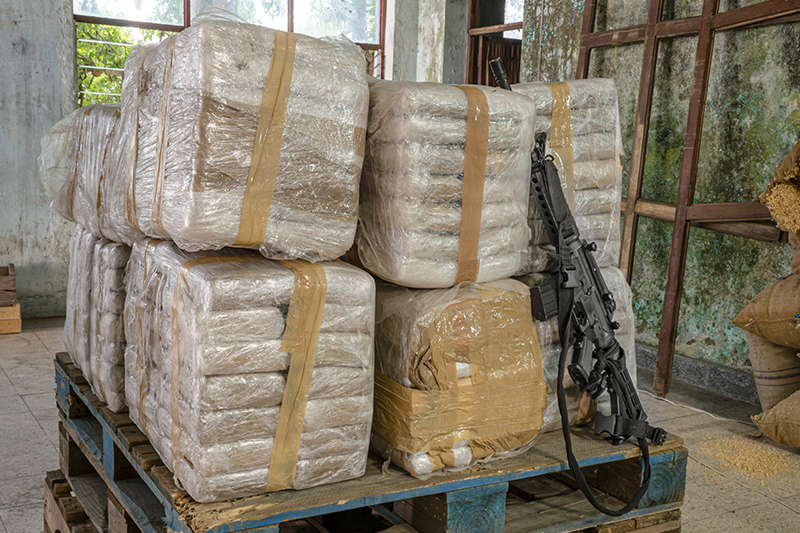The large-scale drug trafficking operation of an infamous cartel just got busted in a mountain state some 1,400 miles from its Mexican headquarters and only one U.S. official, a local prosecutor, has dared to acknowledge the obvious; “This poison is coming over from our southern border unchecked,” said the elected prosecutor of Colorado’s largest district. “It will not stop coming over the border from Mexico into our communities until the federal government takes that porous border seriously.” His name is John Kellner, district attorney in the state’s 18th Judicial District which serves a population of about 1.3 million and covers Arapahoe, Douglas, Lincoln, and Elbert counties. The area varies from Denver suburbs to rural neighborhoods.
The recently dismantled operation was based in Denver and has ties to the Sinaloa Cartel which is headquartered some 1,400 miles away in the northwest Mexican city of Culiacan in the state of Sinaloa. A large stash of weapons and drugs were seized by a task force consisting of federal, state, and local law enforcement agencies. Around 110,000 counterfeit fentanyl pills were confiscated along with 11.5 kilograms of cocaine, six kilograms of methamphetamine, 8.5 pounds of heroin, 28 firearms, three hand grenades, multiple high-capacity magazines including one 200-round drum magazine, armor piercing ammunition, body armor with rifle rated ballistic armor plats and $450,000 in U.S. currently. Nineteen people have been indicted, according to a statement released by the Drug Enforcement Administration (DEA). In the document the agency’s Denver Acting Special Agent in Charge, David Olesky, says “this investigation demonstrates and corroborates the alarming trend in counterfeit prescription pills laced with fentanyl flooding our streets, as well as the continuing nexus between drug trafficking and violent crime impacting our communities.”
The DEA began investigating the drug smuggling operation in April. Charges range from racketeering and conspiracy under the Colorado Organized Crime Control Act to drug distribution and money laundering. A 20-count indictment issued by Colorado’s 18th Judicial District Grand Jury outlines how the defendants distributed large quantities of cocaine, heroin, methamphetamine, fentanyl, and other controlled substances throughout the counties in its jurisdiction. Among the key defendants is Saul Ramon Rivera-Beltran, a 30-year-old who lives in Thorton and coordinated the drug shipments from Mexico, authorities say. The fentanyl is believed to have been manufactured in Mexico, smuggled into the United Sates across the Mexican border, and eventually brought to Colorado, according to prosecutors.
Fentanyl is a highly addictive synthetic opioid that is up to 100 times more potent than morphine. Synthetic opioids, including fentanyl, are the most common drugs involved in the nation’s overdose epidemic. The Centers for Disease Control and Prevention (CDC) reports that overdose deaths involving synthetic opioids were nearly 12 times higher in 2019 than in 2013 and that 36,000 people died from overdoses involving synthetic opioids in 2019. The agency expects an acceleration of overdose deaths during the COVID-19 pandemic. Last month the agency’s National Center for Health Statistics revealed that there were an estimated 100,306 drug overdose deaths in the U.S. during the 12-month period ending in April, an increase of 28.5% during the same period last year. “The new data documents that estimated overdose deaths from opioids increased to 75,673 in the 12-month period ending in April 2021, up from 56,064 the year before,” the CDC writes. “Overdose deaths from synthetic opioids (primarily fentanyl) and psychostimulants such as methamphetamine also increased in the 12-month period ending in April 2021.”
The U.S. government has long documented that Mexican drug cartels are the greatest criminal threat to the country. Federal authorities classify them as Transnational Criminal Organizations (TCO) and not even a global pandemic could slow them down. Cartels adjusted to restrictions imposed by COVID-19 to flood the country with illicit drugs though a staggering 28,000 pounds of methamphetamine and millions of counterfeit pills containing fentanyl were seized by law enforcement agents. Bigger loads reached communities around the nation as deaths and seizures involving meth rose sharply and Mexican TCO’s increased the drug’s availability, according to the Drug Enforcement Administration’s (DEA) National Drug Threat Assessment (NDTA). Nine Mexican TCOs have the greatest drug trafficking impact on the U.S. according to the DEA. Among them are the Sinaloa and Juárez cartels, Los Zetas, La Familia Michoacána, Los Rojos and Guerreros Unidos. The TCOs maintain drug distribution cells in cities across the U.S. that report to leaders in Mexico and dominate the nation’s drug market.























